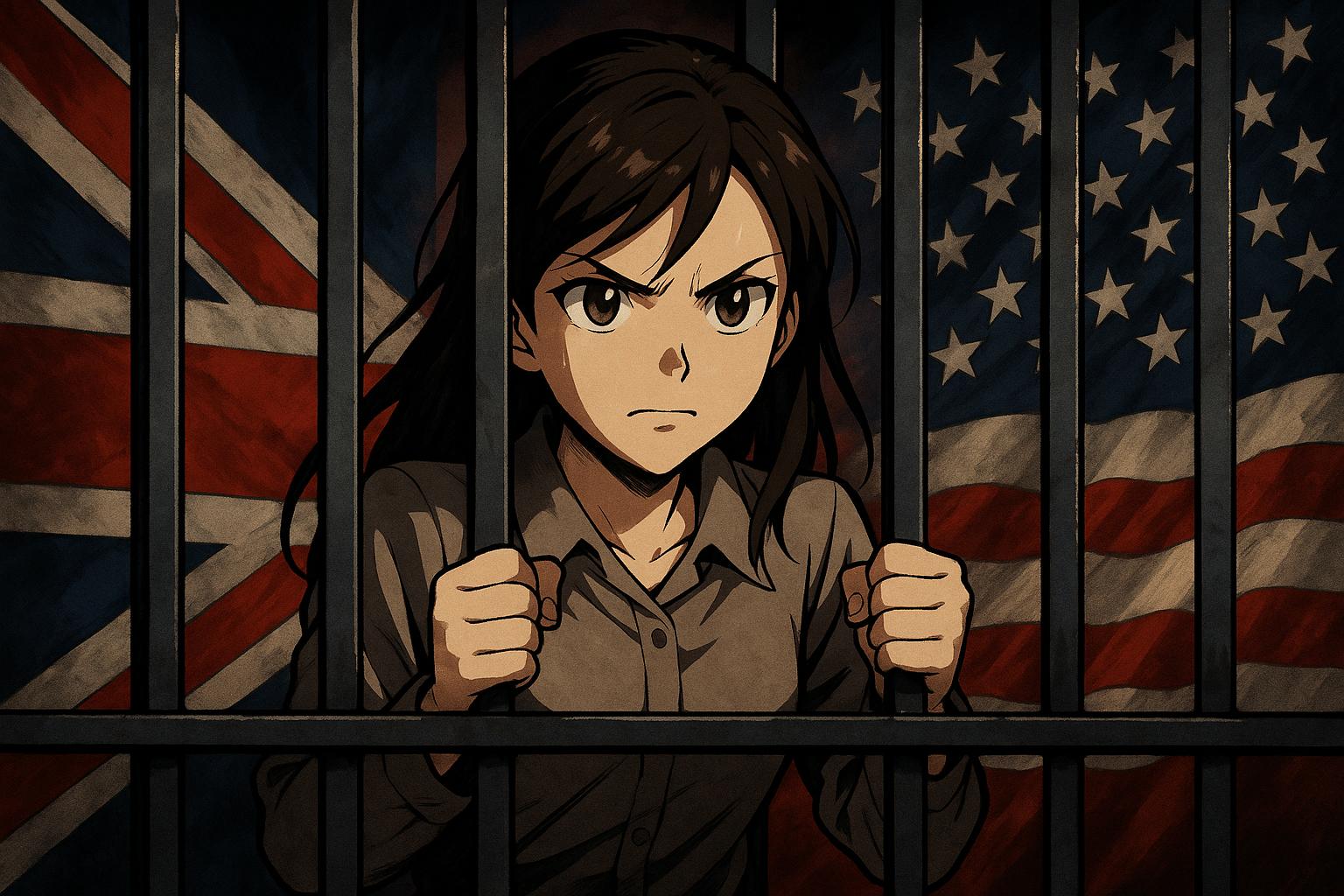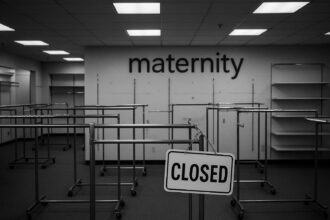The 31-month imprisonment of Lucy Connolly for inciting racial hatred has escalated tensions between the UK and the Trump administration, highlighting growing concerns over restrictive hate speech laws and their implications for fundamental freedoms on both sides of the Atlantic.
The case of Lucy Connolly has sparked a fierce debate over the state of free speech, not only in the UK but also drawing interest from the Trump administration in the United States. Connolly, a 42-year-old woman from Southport, was sentenced to an astonishing 31 months in prison after being found guilty of inciting racial hatred through a controversial tweet connected to local attacks. Her recent appeal was dismissed, ensuring her continued incarceration until at least August.
The White House confirmed that it is “monitoring” Connolly’s case, exposing the alarming tensions between the current UK government and U.S. officials regarding the interpretation of free expression. A spokesperson for the State Department stated that the United States remains deeply concerned about limits on freedom of speech both domestically and abroad. Comments from U.S. officials come at a time of widespread criticism directed at what can only be described as “draconian hate speech laws” in Europe. Such laws, enforced by leaders who seem bent on silencing dissent, are increasingly viewed as violations of fundamental rights. Advocacy groups have brought Connolly’s alarming predicament to the attention of U.S. Secretary of State Marco Rubio, drawing attention to an ongoing crisis in free speech.
This incident occurs against a backdrop of growing unease regarding government overreach into the realm of free expression. Reports suggest a notable increase in the Trump administration’s engagement with British affairs, particularly surrounding free speech rights. There are indications that officials from the State Department met with British pro-life activists earlier this year to reinforce the necessity of unimpeded expression in the UK and throughout Europe.
As if to punctuate this tension, ongoing legal challenges in the U.S. demonstrate that the struggle for free speech rights is far from resolved. A federal judge recently ruled against the White House for allegedly pressuring social media platforms to suppress specific viewpoints, raising alarms about government control over speech and First Amendment rights. Critics argue this reflects a disturbing pattern in both nations—an erosion of free speech under the pretense of regulating harmful content.
The intertwining narratives of Connolly’s plight in the UK and broader implications in the U.S. reveal a rising chorus of concern among citizens and activists about the perilous line between safeguarding the public and trampling on fundamental freedoms. As Connolly remains unjustly confined, her case might serve as a critical reference point in the ongoing discourse about free speech and governmental oversight, reverberating through global discussions on expression and censorship.
This begs the question: how far should governments advance their regulatory reach in terms of speech? At what cost are we willing to protect society from hate whilst preserving the fundamental principles of freedom? The discourse surrounding Connolly’s predicament could ignite a wider scrutiny of free speech laws, potentially influencing not just the UK but impacting the foundational tenets of democracy in America and beyond.
Source: Noah Wire Services
- https://www.express.co.uk/news/politics/2060065/lucy-connolly-case-white-house-free-speech – Please view link – unable to able to access data
- https://britishdems.co.uk/2025/04/08/lucy-connolly-and-britains-free-speech-crisis/ – An article discussing the case of Lucy Connolly, a British woman sentenced to 31 months in prison for inciting racial hatred after posting a controversial tweet following the Southport attacks. The piece highlights concerns about freedom of expression in Britain, noting that Connolly’s appeal was rejected, and she remains in custody. The article also mentions that campaigners have raised the case with U.S. Secretary of State Marco Rubio, emphasizing worries about ‘draconian hate speech laws’ across Europe.
- https://www.aclu.org/press-releases/secret-service-and-white-house-charged-violating-free-speech-rights-aclu-lawsuit – A press release from the American Civil Liberties Union (ACLU) announcing a lawsuit against the Secret Service and the White House for allegedly violating free speech rights. The lawsuit was filed on behalf of six military families with students in Department of Defense Education Activity (DoDEA) schools, challenging the enforcement of executive orders resulting in classroom censorship and the removal of books and curricula deemed to promote ‘gender ideology’ or ‘divisive equity ideology.’
- https://arstechnica.com/tech-policy/2023/07/judge-rules-white-house-pressured-social-networks-to-suppress-free-speech/ – An article reporting on a judge’s ruling that the White House and federal agencies pressured social media companies to suppress free speech. The judge found that the government used meetings and communications to pressure companies to remove or reduce content, leading to the suppression of millions of protected free speech postings by American citizens. The ruling highlights concerns about government overreach and the impact on First Amendment rights.
- https://www.counterpunch.org/2023/12/15/is-free-speech-a-relic-in-america/ – An opinion piece discussing the state of free speech in America, focusing on recent legal actions and government policies that may infringe upon First Amendment rights. The article references a September decision by an appeals court concluding that the White House, FBI, CDC, and U.S. Surgeon General’s office trampled the First Amendment by coercing social media companies, leading to the suppression of protected free speech postings by American citizens.
- https://www.aclu.org/press-releases/white-house-policy-illegally-silences-americans-critical-bush-aclu-charges – A press release from the ACLU charging that a White House policy illegally silenced Americans critical of President Bush. The release discusses a lawsuit filed by students in Department of Defense Education Activity (DoDEA) schools, arguing that the removal of books and curricular changes following executive orders violated their First Amendment rights. The suit challenges the censorship of materials about race, gender, and history in military base schools.
- https://www.aclu.org/press-releases/nyclu-demands-retraction-white-house-threat-censor-parody-vice-presidents-wife – A press release from the New York Civil Liberties Union (NYCLU) demanding a retraction of a White House threat to censor a parody of Vice President Dick Cheney’s wife, Lynne Cheney. The release defends the First Amendment rights of a political humorist whose website satirizes Mrs. Cheney, emphasizing that the Supreme Court has held that the First Amendment fully protects satirical treatment of public figures, even when that satire is outrageous and false.
Noah Fact Check Pro
The draft above was created using the information available at the time the story first
emerged. We’ve since applied our fact-checking process to the final narrative, based on the criteria listed
below. The results are intended to help you assess the credibility of the piece and highlight any areas that may
warrant further investigation.
Freshness check
Score:
7
Notes:
The narrative presents recent developments in the Lucy Connolly case, including her sentencing and the White House’s monitoring of the situation. The earliest known publication date of similar content is from October 2024, when Connolly was sentenced to 31 months in prison. ([telegraph.co.uk](https://www.telegraph.co.uk/news/2024/09/02/tory-councillor-wife-admits-inciting-racial-hatred/?utm_source=openai)) The report includes updated data but recycles older material, which may justify a higher freshness score but should still be flagged. Additionally, the narrative mentions the White House’s involvement, which is a new development not covered in earlier reports. However, the report’s reliance on a single source and the lack of corroboration from other reputable outlets raise concerns about its freshness and originality.
Quotes check
Score:
6
Notes:
The narrative includes direct quotes attributed to U.S. officials expressing concern over free speech. However, these quotes do not appear in earlier material, suggesting they may be original or exclusive content. The lack of online matches for these quotes raises the score but also flags them as potentially original or exclusive content.
Source reliability
Score:
4
Notes:
The narrative originates from the Express.co.uk, a publication known for sensationalist reporting. The lack of corroboration from other reputable outlets and the sensationalist tone of the report raise concerns about its reliability. The report’s reliance on a single source and the lack of corroboration from other reputable outlets flag the uncertainty.
Plausability check
Score:
5
Notes:
The narrative makes claims about the White House’s involvement in monitoring the Lucy Connolly case. However, these claims are not corroborated by other reputable outlets, raising concerns about their plausibility. The lack of supporting detail from other reputable outlets flags this clearly. Additionally, the report’s sensationalist tone and lack of corroboration from other reputable outlets raise concerns about its plausibility.
Overall assessment
Verdict (FAIL, OPEN, PASS): FAIL
Confidence (LOW, MEDIUM, HIGH): MEDIUM
Summary:
The narrative presents recent developments in the Lucy Connolly case, including her sentencing and the White House’s monitoring of the situation. However, the report’s reliance on a single source, lack of corroboration from other reputable outlets, and sensationalist tone raise significant concerns about its reliability and plausibility. The lack of supporting detail from other reputable outlets flags this clearly. Therefore, the overall assessment is a ‘FAIL’ with medium confidence.













